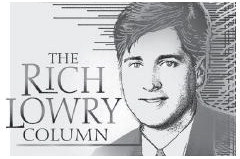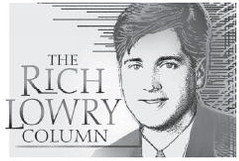The great pricegouging walk back


Never mind.
If you thought cracking down on price gouging was a key element of the Kamala Harris economic program — because she said as much in her economic speech a couple of weeks ago — it turns out you were mistaken.
Harris merely wanted people to know how seriously she takes escalating prices at the grocery store. It was only a minor suggestion — trifling, really — to replicate the smallscale anti-price gouging laws seen at the state level.
Regardless, we all know that there will never be the votes to pass it through Congress. In short, nothing to see here. Can’t we get back to feeling “the joy”? Insert funny and clickable coconut meme here.
This is basically what Democrat insiders have been saying about a Harris policy proposal that has gotten the most attention of any of her month-long campaign.
As Politico put it: “Under pressure to defend Kamala Harris’ grocery price gouging plan, some Democratic lawmakers are delivering a quiet message to anxious allies: Don’t worry about the details. It’s never going to pass Congress.”
The Washington Post notes that Harris allies “are arguing both publicly and privately that her plans have been taken out of context.”
That Harris has reversed field on so much of what she said during her ill-fated primary campaign and its aftermath suggests that she wasn’t very good at policy in 2019 and 2020. The walk-back on price gouging suggests that she isn’t very good at it in 2024, either.
In her speech, Harris said: “So, believe me, as president, I will go after the bad actors. And I will work to pass the first-ever federal ban on price gouging on food. My plan will include new penalties for opportunistic companies that exploit crises and break the rules.”
Sounds dramatic, right? The “believe me” is a particularly nice touch given how her supporters would immediately be saying, in effect, that she shouldn’t be believed.
The premise of the proposal was always ridiculous. The idea that food companies and grocery stores suddenly began to gouge consumers at the moment when supply-chain disruptions, excessive government spending, low interest rates and international disorder drove a historic bout of inflation never made any sense.
If they had this kind of market power, they presumably would have exercised it in the decades prior to Joe Biden presiding over a period of runaway prices.
It was equally absurd to pretend that the government could make illegal this non-existent problem. If the Federal Trade Commission, the potential vehicle for ending all the alleged price gouging, can magically end inflation, why didn’t the Biden administration use it for this purpose when prices were rapidly accelerating?
Needless to say, no one should have any confidence that the FTC knows what the price of eggs or paper towels should be.
The minimalist gloss on the Harris proposal is that it is, in the words of The Post, “a targeted expansion of existing state powers rather than new government ‘price controls’ that would transform the U.S. economy.”
These state laws are designed to prevent exploitative pricing in the midst of disasters. It’s not clear why the federal government itself needs a statute banning people from, say, continued from page
charging exorbitant amounts for bottled water after hurricanes, or how such a statute would prevent economy-wide inflation.
This back-filling and explaining away wouldn’t be necessary if Harris hadn’t spoken in such sweeping terms about a new federal power to control prices. And she didn’t do it spontaneously, but reading from a script prepared by advisers who presumably gave it some thought. What we are now being told was a way to convince people how much Harris cares about fighting inflation really shows how little she cares about what she says and what she proposes.
Her allies are making what’s ultimately a damning defense — don’t mind her, she’s just trying to say things that sound good.
Rich Lowry is editor of the National Review.
Synd., Inc.






out of
Posted on